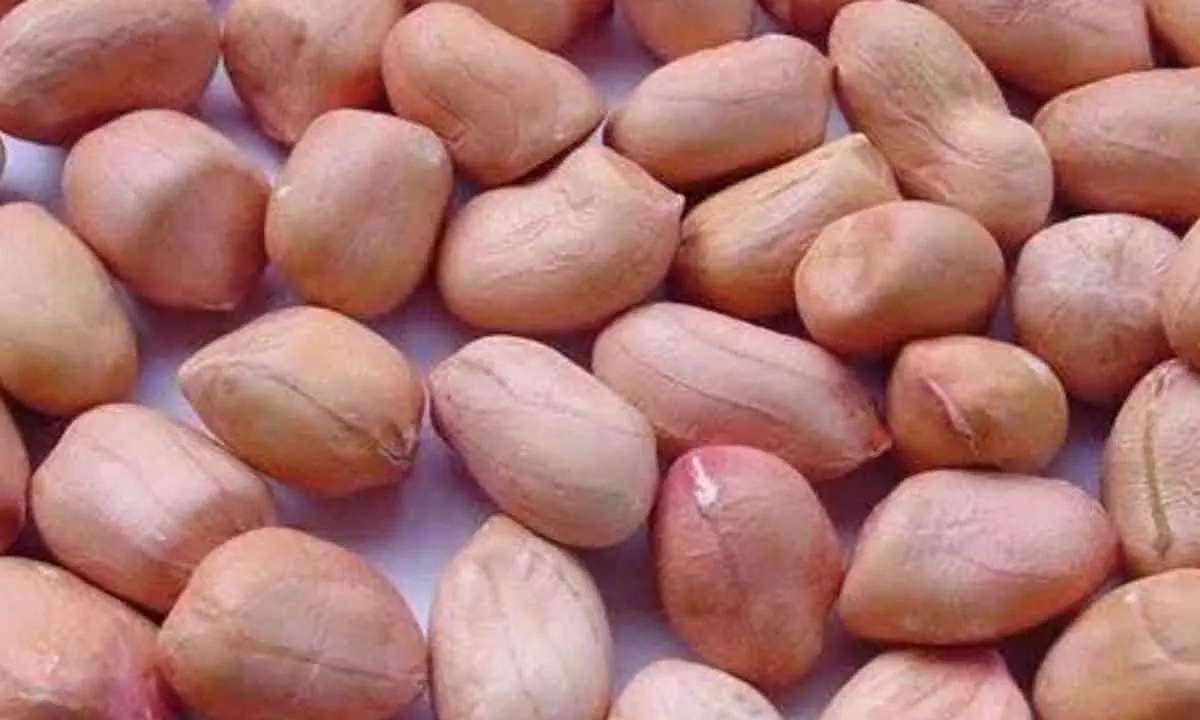Anantapur: Demand for groundnut seed declines in Anantapur district

For the current season, the government has estimated the demand to be around 1.78 lakh quintals against 2 lakh quintals in the previous year
Anantapur-Puttaparthi : The AP Seeds Corporation and the Department of Agriculture are coordinating preparations in Anantapur and Sri Sathya Sai districts for the sale of subsidised groundnut seeds at the Rythu Bharosa Kendras (RBKs).
However, the planned sales volume for the current season has decreased from 1,00,000 quintals in 2022 kharif season to 78,000 quintals. In Sri Sathya Sai district, the government intends to sell 1,00,000 quintals.
In 2016, 3.9 lakh quintals of groundnut seeds were sold in Anantapur district. However, over the years, the demand has been declining as farmers have shifted their focus to other crops due to the decreasing profitability of groundnut cultivation.
During the 2022 kharif season, the maximum demand in the undivided Anantapur district was slightly above 2 lakh quintals. For the current season, the government has estimated the demand to be around 1.78 lakh quintals.
According to Joint Director (JD) of Agriculture B Chandra Naik, a total of 15,000 quintals of groundnut seed has been prepared and made available at the RBKs so far. Additionally, registration has been completed for more than 15,000 quintals by 13,000 farmers
As kharif season has begun with the onset of monsoon, the rampant circulation of spurious seeds versus poor germination has become a cause for concern to farmers across the district.
Farmers were overjoyed when the southwest monsoon is going to start from June 4 but it has turned into a woe with the groundnut crop sown in close to 4 lakh hectares in the district getting badly affected due to water stagnation or excess moisture in the soil. Last year, the groundnut crop sown in June and July (46,850 hectares and 4,09,254 hectares respectively) witnessed thick vegetative growth with poor flowering and formation of pegs and conversion of pegs into pods.
In the last 25 years, profitable groundnut yields were recorded only in seven years – 1995 (1,310 kg/ha), 1996 (711), 1998 (1,145), 2000 (1,116), 2004 (798), 2007 (1,258), 2017 (992), 2018(1240), 2019 (1,250 kg/ha).
According to a joint study conducted by Dr M Suresh Babu and Goutham Buddha, farmers producers organisation (FPO), the crop is subjected to vagaries of climate and therefore recommends diversification of crops to avoid further losses.
Of the seeds that are distributed on subsidy through the Department of Agriculture in Anantapur district, only 20 per cent are certified seeds and the rest are truthful seeds. In 2022 kharif season, of the 5 lakh quintals of seed distributed by the department of agriculture, only one-lakh quintals were certified seeds and the rest are truthful seeds.
Truthful seeds are those that are not subjected to the seed certification process but have a label provided by the seed producers themselves, indicating the germination and purity levels of seed. In other words, truthful seeds are those whose quality is vouched for by the producers themselves and not by the state seed certifying agency.
The system of seed production and distribution regarding groundnut in Anantapur district has several implications for seed quality and thereby on yield.
Seed production in the formal sector, that is, groundnut produced for purposes of seed by registered farmers or in seed villages, plays a very limited role in the overall seed requirement of district.
While one-third of seed requirement of farmers is met by the agricultural department, only a small portion of it, say, about 20 percent, is produced as certified seeds. The bulk of seed requirement is met by farmers themselves either by way of their own retained seeds or from other farmers or friends or relatives or from middlemen, who deal with it.
Over 150 tons of inferior quality seed supplied to RBK has been sent back. Moreover, the Rythu Bharosa Kendrams are not maintaining the stocks. Last year poor allocations were done to groundnut. Farmers are on crossroads whether to go for cotton or groundnut.










